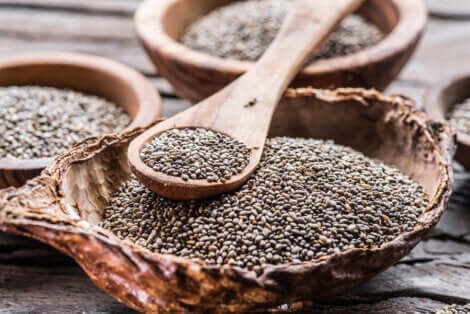4 Vitamins that Help You Heal Your Lungs After Smoking

If you stopped smoking recently or are working your way up to it, you should know that, as you adopt a healthier lifestyle, you should try to improve your diet and incorporate foods rich in certain nutrients to help your lungs heal or, rather, improve your condition.
People tend to think that quitting smoking is enough to make everything “perfect” again. However, this isn’t the case. They need to add measures that benefit their body and, of course, learn to maintain them in a consistent way over time. Only then will we appreciate true results.
While it’s true that there’s no diet for ex-smokers, healthy eating plans can be a good guide for them. Two examples are the Mediterranean diet and the Harvard plate.
Below, we’ll tell you what foods you should regularly include in your diet when you stop smoking. Read on to discover what options to take advantage of!
1. Foods rich in vitamin C

Smoking could reduce the vitamin C in your body by 25%. As a result, experts consider it necessary to increase your intake of foods rich in this vitamin.
According to Dr. Jens Lykkesfeldt, some ex-smokers could take vitamin C supplements in moderation. However, this doesn’t mean that everyone should. Each case must be evaluated.
You can eat fruits rich in vitamin C, such as: kiwi, lemon, tangerine, grapefruit, and orange.
2. Vitamin A
Vitamin A, or beta-carotene, deficiency can cause changes in your immune system. Thus, the number of infectious diseases in your respiratory system can increase.
You can find this nutrient in beef liver and other organs, fortified cereals, dairy products, salmon, plums, pumpkins, zucchini, melon, mangoes, peaches, grapefruit, chard, watermelon, tomatoes, carrots, and broccoli, among others.
We recommend you also read: Optimize Your Lungs by Adding these Food Items to Your Diet
3. Vitamin E

Vitamin E or tocopherol is a fat-soluble vitamin that’s an antioxidant and helps protect essential fatty acids. Also, it helps boost the immune system.
To reap the benefits and heal your lungs, try to include vitamin E naturally by consuming healthy fat sources, such as:
- Coconut.
- Broccoli.
- Seeds.
- Spinach.
- Nuts.
- Egg yolk.
- Brussels sprouts.
4. Vitamin B9
Vitamin B9, or folic acid, contributes to the creation of blood cells. These influence the prevention of anemia and help to keep your skin healthy.
Besides healing our lungs after smoking, vitamin B9 is necessary for your central nervous system to function correctly. This is because this vitamin plays a role in the synthesis of the transmissions.
If that doesn’t seem like it’s enough, you should know that this vitamin helps active smokers kick the habit. To get vitamin B9, you need to eat:
- Soy.
- Raisins.
- Strawberries.
- Walnuts.
- Lemon.
- Onion.
- Pumpkin.
- Avocado.
- Carrots
Other ways to heal your lungs

- Avoid eating junk food, fried foods, and industrial drinks.
- The products you should be especially careful with are soft drinks, because they alter the nervous system and the functioning of the intestines, thus accentuating the harmful effects of cigarettes.
- When planning your menus, include foods rich in tryptophan, such as soy. This is the amino acid that produces serotonin. This is useful in people who are quitting smoking, as high serotonin levels reduce anxiety.
- The damage nicotine causes accelerates the loss of bone mass that occurs with age. Thus, consuming more calcium counteracts this effect and helps to maintain healthy bones to prevent fractures and other injuries.
Exercise helps improve the cardiopulmonary system. Thus, by working out or doing a physical activity every day, you contribute to exercising your heart. This improves blood circulation and also helps prevent the formation of thrombi in the arteries that, in the long term, cause heart attacks.
Also, regular exercise decreases the incidence of high blood pressure and improves lung capacity, which will help you maintain a normal respiratory rate (14 to 22 breaths per minute).
Quit smoking and start healing your lungs
Finally, it’s important to remember that tobacco is one of the most important risk factors in the development of serious diseases. Therefore, it’s best to quit this habit as soon as possible.
Finally, experts also recommend that, if you want to quit smoking, you should also refrain from including supplements of any kind in your diet without first consulting your doctor.
All cited sources were thoroughly reviewed by our team to ensure their quality, reliability, currency, and validity. The bibliography of this article was considered reliable and of academic or scientific accuracy.
-
Albanes, D., Heinonen, O. P., Taylor, P. R., Virtamo, J., Edwards, B. K., Rautalahti, M., … & Barrett, M. J. (1996). α-Tocopherol and β-carotene supplements and lung cancer incidence in the Alpha-Tocopherol, Beta-Carotene Cancer Prevention Study: effects of base-line characteristics and study compliance. JNCI: Journal of the National Cancer Institute, 88(21), 1560-1570.
-
Harats, D., Ben-Naim, M., Dabach, Y., Hollander, G., Havivi, E., Stein, O., & Stein, Y. (1990). Effect of vitamin C and E supplementation on susceptibility of plasma lipoproteins to peroxidation induced by acute smoking. Atherosclerosis, 85(1), 47-54.
-
Omenn, G. S., Goodman, G., Thornquist, M., Grizzle, J., Rosenstock, L., Barnhart, S., … & Keogh, J. (1994). The β-carotene and retinol efficacy trial (CARET) for chemoprevention of lung cancer in high risk populations: smokers and asbestos-exposed workers. Cancer research, 54(7 Supplement), 2038s-2043s.
-
Omenn, G. S., Goodman, G. E., Thornquist, M. D., Balmes, J., Cullen, M. R., Glass, A., … & Barnhart, S. (1996). Effects of a combination of beta carotene and vitamin A on lung cancer and cardiovascular disease. New England journal of medicine, 334(18), 1150-1155.
This text is provided for informational purposes only and does not replace consultation with a professional. If in doubt, consult your specialist.








